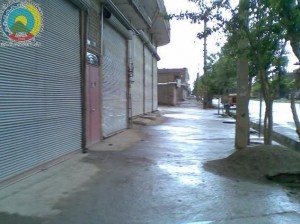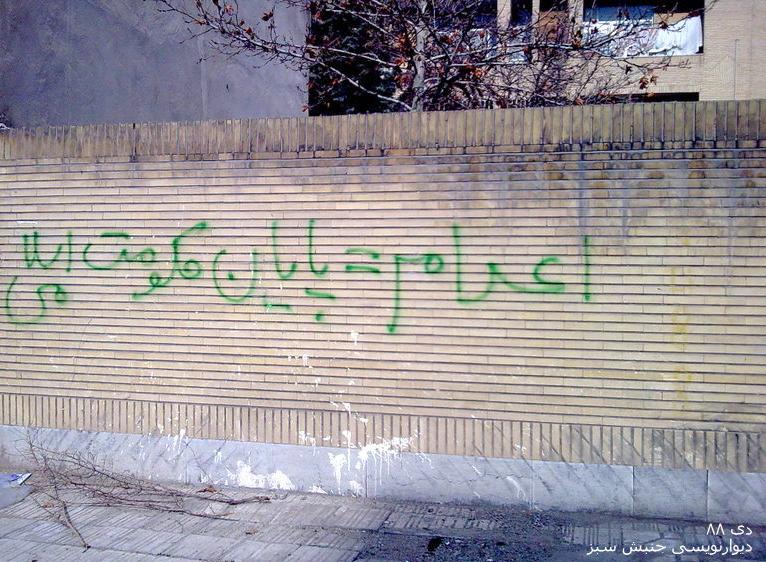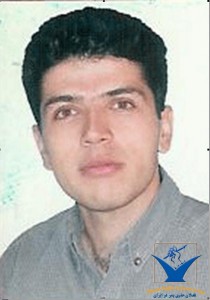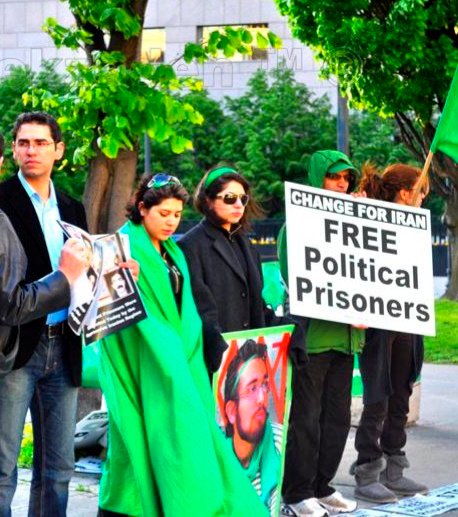The Latest from Iran (14 May): The Meaning of the Strike?
 Friday, May 14, 2010 at 18:46
Friday, May 14, 2010 at 18:46  2035 GMT: Film Corner (cont.). Earlier we reported on the unclaimed chair for the Grand Jury at the opening of the Cannes Film Festival (see 0615 GMT)
2035 GMT: Film Corner (cont.). Earlier we reported on the unclaimed chair for the Grand Jury at the opening of the Cannes Film Festival (see 0615 GMT)The seat was to be filled by Iranian director Jafar Panahi, who had to send this message:
I salute you from my narrow and dark cell in Evin Prison. Unfortunately it is only today that I heard of your valuable efforts [to release me] during the Festival of Cannes....I greet you from here and would like to express my gratitude to all festival organisers for their humanity and decency.
NEW Iran Analysis: The Economic Squeeze and the Real Sanctions Story (Colvin)
UPDATED Iran Video: Strike in Kurdistan (13 May)
Iran Special: Executions, Politics, and the Attack on Nazila Fathi and The New York Times
Iran Transcript: Mousavi “Do Iranian Mothers Have Rights?” (12 May)
Iran Document: A Letter from Majid Tavakoli About the Executed (11 May)
The Latest from Iran (13 May): Justice, Legitimacy, and a Strike in Kurdistan
2030 GMT: Political Prisoner Watch. RAHANA reports that Bahman Khodadadi has been missing since Saturday, when he was summoned to the Ministry of Intelligence in Isfahan. The website also claims Azeri civil rights activists Reza Abdi and Alireza Hosseinzadeh were arrested Tuesday in Tabriz.
1945 GMT: The Executions and After. RAHANA offers a useful summary of "The Week in Kurdistan".
1820 GMT: The Oil Squeeze. Rah-e-Sabz reports that because of sanctions, lack of investment, and government mismanagement, oil production dropped by 750,000 barrels (almost 20%) to less than 35. million barrels per day. Sales fell by 450,000 barrels daily, as Saudi Arabia took up more of China's demand for imports.
1812 GMT: The Writing on the Wall. EA's German Bureau brings me this picture of graffiti in Iran. It is from January, but it has a current resonance, I think.
"Execution = End of Islamic Rule".

1750 GMT: Political Prisoner Watch. RAHANA reports that Arash Saboonchi, a student activist and member of Mehdi Karroubi’s presidential campaign in Arak in northwest Iran, has been arrested and taken to an unknown location by plainclothes agents.
1725 GMT: Larijani, Nuclear Dealmaker? A whiff of a most important story in Khabar Online, the website connected with Speaker of Parliament Ali Larijani. It uses purported remarks from Kazem Jalali of Parliament's National Security and Foreign Policy Commission to play up Larijani's role as broker in talks on Iran's nuclear programme:
According to Khabar Online correspondent, [in] the hallway of the Majlis, Kazem Jalali commented on diplomatic positions expressed by Larijani and f negotiations at international summits: "A collective body monitored by the Supreme Council of National Security decides and authorizes the Parliament Speaker to take such measures, given that as a body corporate and senior member of the council, he has a mastery of the standards of the Islamic Republic's diplomacy....
In many instances the international negotiations conducted by the Parliament Speaker are more productive in breaking the impasses
Jalali supposedly added, "We have never excluded the issue of nuclear fuel exchange from our agenda. We are ready to receive fair proposals on the issue and it has been underlined by Iranian officials several times. But I believe that through their mediations Brazil and Turkey can play an important role to resolve the problem. Obviously we will welcome their contribution."
The significance, however, is not just the international dimension, with the further signal that a deal mediated by Brazil or Turkey is a possibility for Tehran. It is also internal: last October the uranium enrichment talks broke down in part because of opposition within Iran.
Larijani, speaking on his behalf or representing the Supreme Leader, was part of that opposition to the President's aspirations. If he is now portraying himself as a factor for a deal, it not only shifts the international equation but also the power equation vs. Ahmadinejad.
1500 GMT: Keep the Children at Home? Khabar Online claims that the children of administration officials are being stopped from studying abroad.
1450 GMT: The Executions and Pressure on Kurdish Teachers. RAHANA reports that Heydar Zaman, Mostafa Sarbazan and Ramin Zandnia, three activists of the Teachers Trade Union in Kurdistan, were summoned to Intelligence Headquarters in Sanandaj. The questioning took place a day after the execution of teacher Farzad Kamangar.
Four other activists of the union were arrested on Sunday and released after long interrogations.
1440 GMT: Friday Prayers Amended (No Sinful Earthquakes But Lots of Bad Hijab). Seems I judged today's Friday Prayer Speaker, Hojatoleslam Kazem Sedighi, too quickly (1300 GMT).
He did have a whip-'em-up line, much better than the G-15 summit and the Tehran Book Fair, for the audience. Apparently a "soft war" against hijab has started in the name of "freedom". Western officials of Satan, who once Reza Shah to get rid of the hijab, are carrying out their subversion by bringing women with "bad hijab" to Qom.
Seddiqi did have to backtrack on his previous big hit of breasts=earthquakes, announcing that sin is not the only reason for natural disasters in the West.
No matter. Looks like Seddiqi's "bad hijab" routine is going down well with the critics: Ayatollah Jannati, the head of the Guardian Council, has given it a round of applause.
1430 GMT: Where's Mahmoud? President Ahmadinejad has delivered a speech in which he announced that God has chosen the Iranian people to promote justice and monotheism on Earth.
1300 GMT: Your Friday Prayer Summary. Last time Hojatoleslam Kazem Seddiqi took the podium for Tehran Friday Prayers, he became a global religious star with his warning that women's breasts can cause earthquakes.
He didn't shake things up as much today. His hook-line of Iran's prominence at the G-15 summit of non-aligned countries just didn't have the same appeal, and he had to fall back on a shout-out for five million people at the Tehran Book Fair showing the culture, civilization and ideals of Iran and its youth.
1155 GMT: The Executions. Nine expatriate and domestic parties and political organisations have called for rallies abroad this Sunday to protest recent executions. Those involved in the call are Republicans, Democratic Party of Kurdistan, Komeleh, Democratic Party of Iran's People, National Front Europe, Feddayin-e Khalq (majority and minority), Provisional Council of Leftist Socialists, and Movement of Democratic and Secular Republicans.
1145 GMT: Cultural Vaccination. Mahmoud Salari, the director of the Tehran Book Fair, has declared that books by famous authors such as Forugh Farrokhzad, Hushang Golshiri, and Sadegh Hedayat are like palm-reading (faal va kafbini). He declared that all books published before 2005 will be removed as a vaccination against "cultural disease", and he said that only religious thinking should be promoted to maintain the honour of the Iranian system (nezam).
It looks like Salari and the Book Fair organisers may have more serious worries than palm-reading, however. Khabar Online publishes a photograph of the state of the booths as the Fair formally opened.
1130 GMT: Interrogation. Kalemeh reports that reformists in Tabriz in East Azerbaijan have been summoned by authorities and questioned for up to four hours on subjects such as the alleged involvement of the "terrorist" Mujahedin-e-Khalq (MKO) in the opposition movement.
1005 GMT: Cultural Jeremiad. Grand Ayatollah Makarem-Shirazi has pronounced that, with satellites, the vice of the Internet and its websites swashes from west to east and back. He declared that those moral vices have become political and social, and politicians of the world promote them for their goals.
1000 GMT: Karroubi Watch. Speaking with student activists and the family of the detained Majid Tavakoli, Mehdi Karroubi has declared, "Rest assured that the situation won't remain like this.
0950 GMT: The Executions and the Strike. Nazila Fathi reports in The New York Times:
Iranian Kurds staged one of their largest strikes in recent years, closing shops and bazaars in nearly all Sunni Kurdish cities and towns in eastern Iran to protest the executions of five people, including four Kurdish activists, on Sunday, according to opposition Web sites and witnesses....
Many analysts and opposition figures interpreted the executions on Sunday as a warning that the government would not tolerate protests next month on the election’s first anniversary.
Rah-e-Sabz has a lengthy account of the day in Kurdistan, with a heavy security presence and Kurdistan's largest city Sanandaj and many other towns mostly deserted.
0940 GMT: The Executions and the Opposition. Reporting from Tehran, Thomas Erdbrink of The Washington Post picks up on the political context of last Sunday's execution of five Iranians. He quotes Ali Shakorirad, a leader of the reformist Islamic Participation Front, "The government is trying to create a security atmosphere as a crucial month approaches," and gives the pro-Government counterpoint from "Amir Mohebbian, "Their [opposition] movement has lost steam, and its leaders are disillusioned and hopeless. Those executed were terrorists. They who sympathize with terrorists are terrorists themselves."
Erdbrink also quotes an office clerk, "Fahrzad", who says, "We have all tried to return to normal, but there are killings and arrests. Maybe some are smiling on the outside, but inside we are all still upset."
0745 GMT: Economy Watch. We've posted an analysis from Ross Colvin, "The Economic Squeeze and the Real Sanctions Story".
0625 GMT: The Executions and the Opposition. EA readers may have noted the recent attempt by to deride coverage of Sunday's executions, with the claim that The New York Times showed "pro-Green" bias with the analysis that the hangings might have occurred to deter the opposition from protests on 12 June, the anniversary of the election.
A follow-up to the executions from Kayhan, the "hardline" Iranian newspaper (hat-tip to an EA reader):
The leaders of the recent plots have supported the five terrorists whose hands were stained with the blood of innocent people, and who were executed in Evin prison on May 10th. This shows that these people cannot be expected to retreat, and it would be very naive to believe that they would repent. It is all over now, and no phrase can better describe the plotters’ situation than "some people have joined the anti-Revolution and terrorists camp".
0620 GMT: Subsidy Cuts. President Ahmadinejad has said that his subsidy reduction plan will begin in the second half of the Iranian year, i.e., from late September 2010.
Previous reports said some reductions would be implemented from 21 May.
0615 GMT: Film News. As the 63rd Cannes Film Festival opened, one of the nine chairs for jury members was unclaimed.
Iranian director Jafar Panahi, detained in March, remains in Evin Prison.
0600 GMT: Kurdistan Funeral. A copy of a flyer has been posted which indicates that the service for Farzad Kamangar, executed on Sunday, will be in Mohammad Rasoolollah Mosque tomorrow from 9 to 11 a.m.
0555 GMT: Thursday's Top Comment. "Dissected News" on Twitter: "Only the ghosts of Iran's martyrs seem to be on the (Kurdish) streets."
0545 GMT: The Executions...Aftermath. RAHANA reports that the house of Shirin Alamhouli is surrounded by security forces, who are denying entry to relatives. Iranian authorities reportedly are refusing to let the family bury Alamhouli n a Muslim cemetery because she was a "mohareb" (warrior against God).
0530 GMT: Beyond a doubt, the major story yesterday was the stoppage in Kurdistan, a response to Sunday's execution of five Iranians, four of them Kurdish. The logistics meant that confirmed news was slow to come out, but the reports, the pictures, and even the videos emerged.
We had asked earlier this week whether the anger and dismay expressed outside Iran over the executions would be matched by public reactions within the country. We now have an answer --- we will watch how far that answer extends with responses beyond Kurdistan.
Persian2English features a further report, with photos, on yesterday's events.
 Ali Larijani,
Ali Larijani,  Ali Shakorirad,
Ali Shakorirad,  Alireza Hosseinzadeh,
Alireza Hosseinzadeh,  Arash Saboonchi,
Arash Saboonchi,  Ayatollah Ahmad Jannati,
Ayatollah Ahmad Jannati,  Ayatollah Nasser Makarem-Shirazi,
Ayatollah Nasser Makarem-Shirazi,  Bahman Khodadadi,
Bahman Khodadadi,  Cannes Film Festival,
Cannes Film Festival,  Democratic Party of Iran's People,
Democratic Party of Iran's People,  Democratic Party of Kurdistan,
Democratic Party of Kurdistan,  Farzad Kamangar,
Farzad Kamangar,  Feddayin-e Khalq,
Feddayin-e Khalq,  Forugh Farrokhzad,
Forugh Farrokhzad,  Heydar Zaman,
Heydar Zaman,  Hijab,
Hijab,  Hojatoleslam Kazem Seddiqi,
Hojatoleslam Kazem Seddiqi,  Hushang Golshiri,
Hushang Golshiri,  Iran,
Iran,  Iran Elections 2009,
Iran Elections 2009,  Islamic Iran Participation Front,
Islamic Iran Participation Front,  Jafar Panahi,
Jafar Panahi,  Kalemeh,
Kalemeh,  Kayhan,
Kayhan,  Kazem Jalali,
Kazem Jalali,  Khabar Online,
Khabar Online,  Komeleh,
Komeleh,  Kurdistan,
Kurdistan,  Mahmoud Ahmadinejad,
Mahmoud Ahmadinejad,  Mahmoud Salari,
Mahmoud Salari,  Majid Tavakoli,
Majid Tavakoli,  Mehdi Karroubi,
Mehdi Karroubi,  Mostafa Sarbazan and Ramin Zandnia,
Mostafa Sarbazan and Ramin Zandnia,  Movement of Democratic and Secular Republicans.,
Movement of Democratic and Secular Republicans.,  National Front Europe,
National Front Europe,  Nazila Fathi,
Nazila Fathi,  New York Times,
New York Times,  Persian2English,
Persian2English,  Provisional Council of Leftist Socialists,
Provisional Council of Leftist Socialists,  RAHANA,
RAHANA,  Rah-e-Sabz,
Rah-e-Sabz,  Republicans,
Republicans,  Reza Abdi,
Reza Abdi,  Sadegh Hedayat,
Sadegh Hedayat,  Shirin Alamhouli,
Shirin Alamhouli,  Tehran Book Fair,
Tehran Book Fair,  Thomas Erdbrink,
Thomas Erdbrink,  Washington Post in
Washington Post in  Middle East & Iran
Middle East & Iran 

